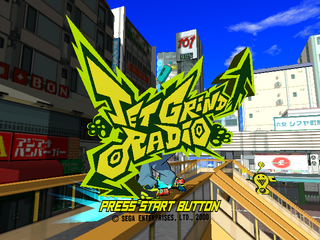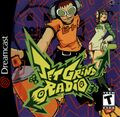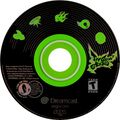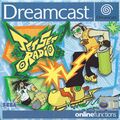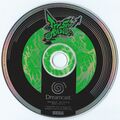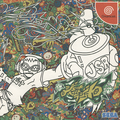Difference between revisions of "Jet Set Radio"
From Sega Retro
Scarred Sun (talk | contribs) m (→Artwork) |
Scarred Sun (talk | contribs) |
||
| Line 8: | Line 8: | ||
|usa=Nov 1, 2000 | |usa=Nov 1, 2000 | ||
|japan=Jun 29, 2000 | |japan=Jun 29, 2000 | ||
| + | |rrp_jp=5,800 | ||
|genre=3D Action | |genre=3D Action | ||
|esrb=t | |esrb=t | ||
Revision as of 16:34, 8 September 2010
| Jet Set Radio |
|---|
| System(s): Dreamcast, Game Boy Advance |
| Publisher: Sega |
| Developer: Smilebit |
| Genre: 3D Action |
Jet Set Radio (Jet Grind Radio in North America) is a video game developed by Team Andromeda. But In 1998, The team disbanded replaced By Smilebit (Original Called Team Andromeda 2) and published by Sega on June 29, 2000. Jet Set Radio was designed for the Dreamcast, although a version of the game was later released for Game Boy Advance. A sequel called Jet Set Radio Future was released for Xbox.
Contents
Plot
The game begins in 2000, Shibuya-cho, and is introduced by Professor K, the DJ of a pirate radio station based in Tokyo-to, who explains the basics of life in Tokyo-to for a "rudie", the term he uses to refer to young people who roam the streets spraying and skating. The city is split into three parts -- Shibuya-cho , Benten-cho and Kogane-cho, each of which corresponds to a different time of day. Shibuya is a shopping district full of blue skies and daylight, Benten a nocturnal entertainment spot that represents night, and Kogane a mostly residential area, built on the water, where it is perpetually sunset. In each of these areas the player will encounter a rival gang - the Love Shockers in Shibuya, the Noise Tanks in Benten, and Poison Jam in Kogane - that attempts to usurp the GG's home turf. The player starts off forming a skate gang which also resides in Shibuya-cho, and thus forms a rivalry between the gangs in the area. After completing a set of menial challenges, designed to introduce the player to the control system, Gum and Tab join the gang forming the first 3 members of the GG's. The player starts out as Beat, a 17-year-old rudie who ran away from home like many other Japanese rudies. Beat was first shunned from gang to gang over and over again until he decided to start his own gang. Beat is the leader and founder of the GG's. The player first starts out spraying a little graffiti in Shibuya-Cho looking to recruit members. First Gum joins, then Tab.
The initial stage is set in a Shibuya bus station, in which the player has to "tag" various parts of the bus station, as well as spray over existing tags, so as to gain the area as part of their territory. While tagging these places, the player is pursued by policemen and their leader, Captain Onishima. The police, the S.W.A.T team, and Goji Rokkaku's Golden Rhinos are yet another obstacle to avoid while defeating rival gangs. Also, Professor K narrates specific parts of the game via his eponymous pirate radio station called Jet Set Radio.
Other gangs which feature in the game as opponents are the Noise Tanks, who appear to be semi-cyborgs, Poison Jam, brutish thugs who wear fish costumes, and the Love Shockers, an all-girl gang made up of jilted lovers. Once the protagonist defeats each gang they hand over their belongings and grant the area to the graffiti gang that dethroned them.
Towards the end of the game the protagonist is hunted by the henchmen of Goji Rokakku, leader of The Golden Rhinos. Once the protagonist successfully usurps the areas seized by the Golden Rhinos, the player then must defeat Goji on a giant rooftop record player, on which Goji has assembled "The Devil's Contract", a record which, when played, is supposed to summon a demon. Goji wants to use the demon to take over Tokyo and eventually the world. After defeating him, however, it is revealed that the record is just an unusual indie release.
History
Jet Set Radio was announced at the Tokyo Game Show in 1999 and generated a prodigious amount of press attention due to its use of the then revolutionary rendering technique, cel-shading. Now commonplace in game design, cel-shading allows for a "cartoon-like" appearance of 3D rendered objects. Jet Set Radio was released in Japan on June 29, 2000. The US release, re-titled Jet Grind Radio, contained two new maps, various new songs, and other in-game content designed to increase the game's appeal to Western audiences. This version also allowed the user to connect to the Internet via SegaNet and download user-created graffiti tags, or upload tags of their own. Sales of the game were relatively low, but despite the commercial failure of Jet Grind Radio, it has gone on to achieve a cult following in the gaming community.
Production Credits
Executive Producer: Shun Arai
Chief Producer: Takayuki Kawagoe
Producer: Osamu Sato
Director: Masayoshi Kikuchi
Senior Planner: Masayoshi Yokoyama
Planners: Toru Oosaki, Norinisa Iwasaki, Takahiro Tabata, Jun Orihara, Yusuke Nakadaira
Chief Programmer: Kazuhisa Hasuoka
Senior Programmer: Outa Sano
Programmers: Kuniniko Mori, Toshihsa Saitou, Touryu Sno, Kenichi Tanase
Chief Graphic Designers: Ryuta Ueda, Kazuki Hosokawa
Senior Graphic Designers: Mano Takayanagi, Tomokazu Honma, Yuichi Higuchi
Graphic Designers: Yusuke Ichikawa, Yousuke Karasawa, Daisuke Tomoda, Hiromi Kawamata, Masato Sekiguchi, Kaori Shoji, Sacniko Morosawa, Nanako Yarimizu, Yuka Warigai, Yumi Morikawa, Makoto Takanasni, Junichi Kakutani, Masamitsu Hayashi
Sound Producer: Yukifumi Makino
Sound Director: Fumitaka Shibata
Music Composer & Sound Effects: Hideki Naganuma
Recording Studio: Wave Master Studio
Chief Recording Engineer: Hirokazu Akashi
Recording Engineer: Yoshitada Miya, Sawako Sogabe
Package & Manual: Kaoru Ichigozaki, Fumiaki Tomura, Toshiki Yamaguchi
Web Site Programmer: Tomonobu Takahashi
Publcity: Miho Masuda
Bgm Performed By: B.B Rights, F-Fields, Reps, Deavid Soul, Idol Taxi, Richard Jacques, Castle Logical, Toronto
Motion Talent: Akira Sakai, Hiroshi Kataoka, Tetsu, Asuka Sekine, Kouros
Logo & Package Design: Graffic Takora Corp.
Graffiti Artists: Erik Haze, Edge, Uecho, Enas, Higuchin, Chikpon, K-Chap
Special Thanks: Michiaki Uchida, Naohiro Warama, Yasuhiro Suzuki, Hisao Oguchi, Takashi Iwade, Tatsuya Andou(Isao Corp. Ltd.), Keiichirou Suzuki, Touru Nishino, Akira Goto, Shuji Hori, Team Andromeda(Original Sega AM6)
Sega of America Dreamcast Inc.
Localzation Producers: Jason Kuo, Klayton Vorlick, Mari N. Snaal
Localzation Manager: Osamu Shinamiya
Product Manager: Rob Alvarez
Associate Product Manager: Dennis Lee
Marketing Director: John Golden
Public Relations: Heater Hawkins, Gwen Marker
Director Creative Services: Robert Schonfisch
Creative Services Specialist: Angela Santos
Promotions: Heater Kashner
Online Senior Producer: A. J. Briones
Online Senior Software Engineer: Alexander Villagran
Online Software Engineer: Shilpa Kulkarni
Lead Tester: Steve Peck
Assistant Lead Testers: Daniel Chang, Adam Terminelld
Sega Europe Ltd.
Director Of Product Development: Naohiko Hishino
Executive Producer: Kats Sato
Producer: Daniel Llewellyn
Assistant Producer: Akiko Koutstal
Test Manager: Jason Cumbersatcn
Lead Testers: Nick Benet, Dawiel Slater, Pete O'brien, Mark Dearsley, Wayne Gardner
Localisation Coordinator: Roberto Parraga-Sawchez
Translators: Anselika Michitscn, Roberto Parraga-Sawchez
European Product Marketing Manager: Jie Pride
European Product Marketing Exective: Mark Fisher
Project Management: Koji Kuroki, Shinobu Shindo
Manual Translation, DTP: Michael Hanna
Voice Director & Casting: Greg Weber (Webtone)
Recording Engineer(Webtone): Greg Weber, David Nowlin
Voice Talent: Andria Batise, Kevin Blackton, Billy Brown, Ryan Canfield, Jeromy Carssow, Matthew Chavez, Errin Clark, Jessica Crispi, Steve Duell, James Gutierrez, Machiko Harashima, Corina Harman, Marcie Henderson, Mike Inouve, Roger Jackson, Jeremy Jones, Jeff Kramer, Resi Mamizuka, Kevin Miller, David Nowlin, Kevin Oshea, Jason Tinker, Andrew Willis, Justin Worsham
Special Thanks: Sandy Castagnola
Cooperation With: ADX
Created By: Smilebit
Presented By: Sega
Artwork
- Jgr logo.jpg
- Jsr professork.jpg
Physical Scans
Dreamcast
- Jsr dc jp disc.jpg
JP disc
